University Professional Planning Essay: Hospitality Industry Focus
VerifiedAdded on 2019/11/26
|6
|1318
|404
Essay
AI Summary
This essay, titled "Foundations of Professional Planning," explores a student's career aspirations within the hospitality and tourism industry, specifically targeting a general manager position. The paper provides an overview of the industry, emphasizing its significance in Australia's economy, cultural representation, and impact on indigenous communities. It details various job roles within the hospitality sector, from entry-level positions to managerial roles, and outlines the required skills, including management abilities, attention to detail, and interpersonal skills. The essay also addresses ethical considerations, such as respecting guest confidentiality and adhering to employment regulations. The student reflects on their personal skills, such as leadership and communication, and how these strengths align with their career goals. The essay references several academic sources to support its analysis of the industry and the skills needed for success.
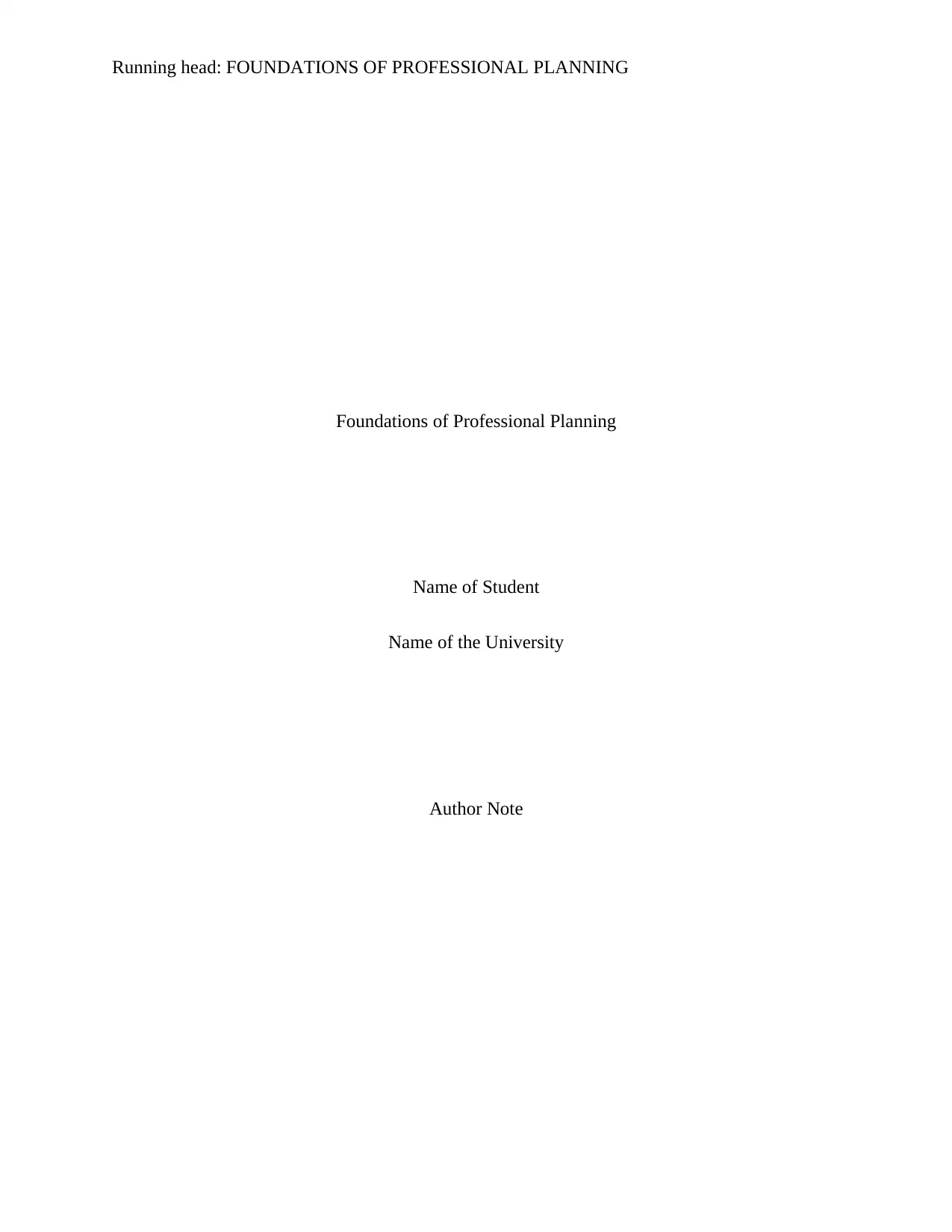
Running head: FOUNDATIONS OF PROFESSIONAL PLANNING
Foundations of Professional Planning
Name of Student
Name of the University
Author Note
Foundations of Professional Planning
Name of Student
Name of the University
Author Note
Paraphrase This Document
Need a fresh take? Get an instant paraphrase of this document with our AI Paraphraser
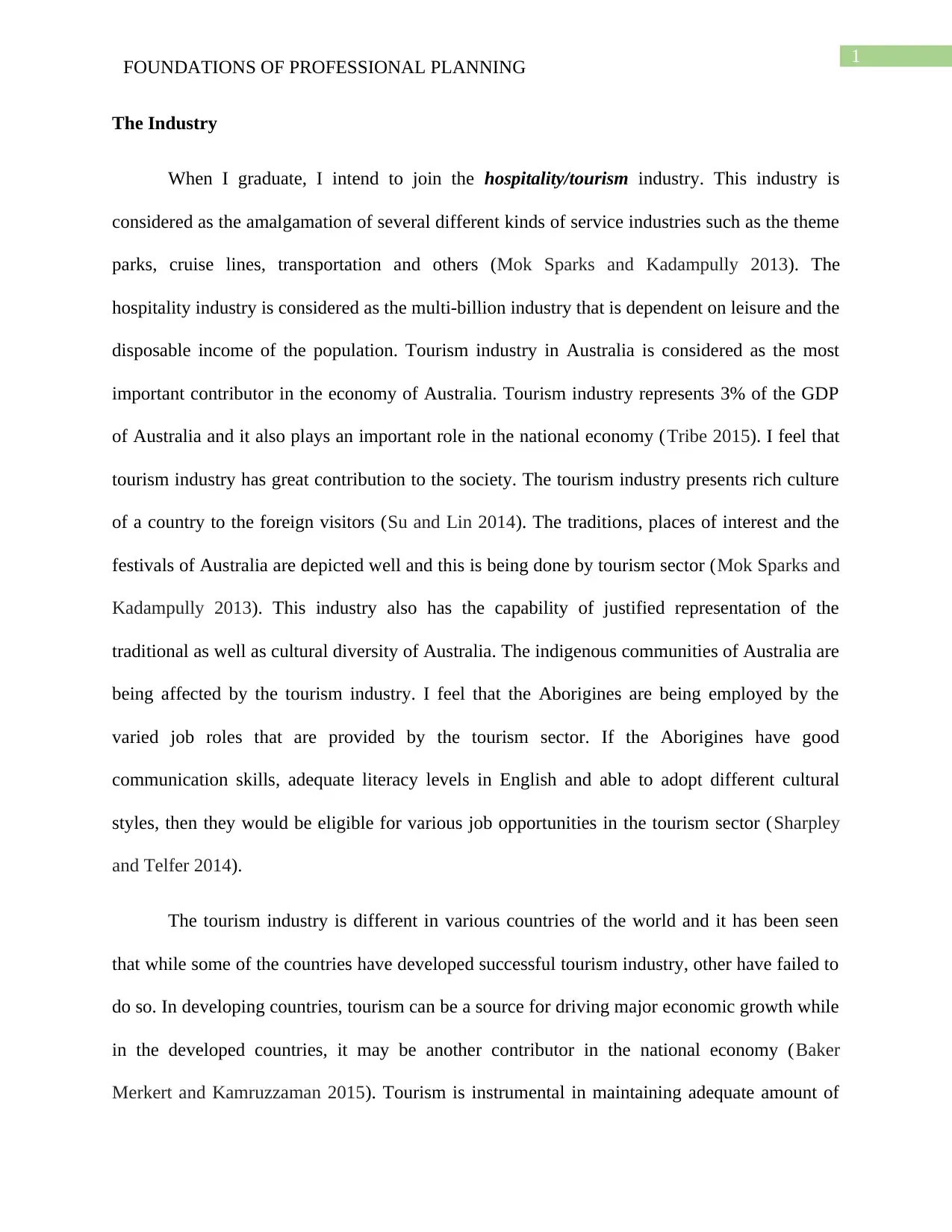
1
FOUNDATIONS OF PROFESSIONAL PLANNING
The Industry
When I graduate, I intend to join the hospitality/tourism industry. This industry is
considered as the amalgamation of several different kinds of service industries such as the theme
parks, cruise lines, transportation and others (Mok Sparks and Kadampully 2013). The
hospitality industry is considered as the multi-billion industry that is dependent on leisure and the
disposable income of the population. Tourism industry in Australia is considered as the most
important contributor in the economy of Australia. Tourism industry represents 3% of the GDP
of Australia and it also plays an important role in the national economy (Tribe 2015). I feel that
tourism industry has great contribution to the society. The tourism industry presents rich culture
of a country to the foreign visitors (Su and Lin 2014). The traditions, places of interest and the
festivals of Australia are depicted well and this is being done by tourism sector (Mok Sparks and
Kadampully 2013). This industry also has the capability of justified representation of the
traditional as well as cultural diversity of Australia. The indigenous communities of Australia are
being affected by the tourism industry. I feel that the Aborigines are being employed by the
varied job roles that are provided by the tourism sector. If the Aborigines have good
communication skills, adequate literacy levels in English and able to adopt different cultural
styles, then they would be eligible for various job opportunities in the tourism sector (Sharpley
and Telfer 2014).
The tourism industry is different in various countries of the world and it has been seen
that while some of the countries have developed successful tourism industry, other have failed to
do so. In developing countries, tourism can be a source for driving major economic growth while
in the developed countries, it may be another contributor in the national economy (Baker
Merkert and Kamruzzaman 2015). Tourism is instrumental in maintaining adequate amount of
FOUNDATIONS OF PROFESSIONAL PLANNING
The Industry
When I graduate, I intend to join the hospitality/tourism industry. This industry is
considered as the amalgamation of several different kinds of service industries such as the theme
parks, cruise lines, transportation and others (Mok Sparks and Kadampully 2013). The
hospitality industry is considered as the multi-billion industry that is dependent on leisure and the
disposable income of the population. Tourism industry in Australia is considered as the most
important contributor in the economy of Australia. Tourism industry represents 3% of the GDP
of Australia and it also plays an important role in the national economy (Tribe 2015). I feel that
tourism industry has great contribution to the society. The tourism industry presents rich culture
of a country to the foreign visitors (Su and Lin 2014). The traditions, places of interest and the
festivals of Australia are depicted well and this is being done by tourism sector (Mok Sparks and
Kadampully 2013). This industry also has the capability of justified representation of the
traditional as well as cultural diversity of Australia. The indigenous communities of Australia are
being affected by the tourism industry. I feel that the Aborigines are being employed by the
varied job roles that are provided by the tourism sector. If the Aborigines have good
communication skills, adequate literacy levels in English and able to adopt different cultural
styles, then they would be eligible for various job opportunities in the tourism sector (Sharpley
and Telfer 2014).
The tourism industry is different in various countries of the world and it has been seen
that while some of the countries have developed successful tourism industry, other have failed to
do so. In developing countries, tourism can be a source for driving major economic growth while
in the developed countries, it may be another contributor in the national economy (Baker
Merkert and Kamruzzaman 2015). Tourism is instrumental in maintaining adequate amount of
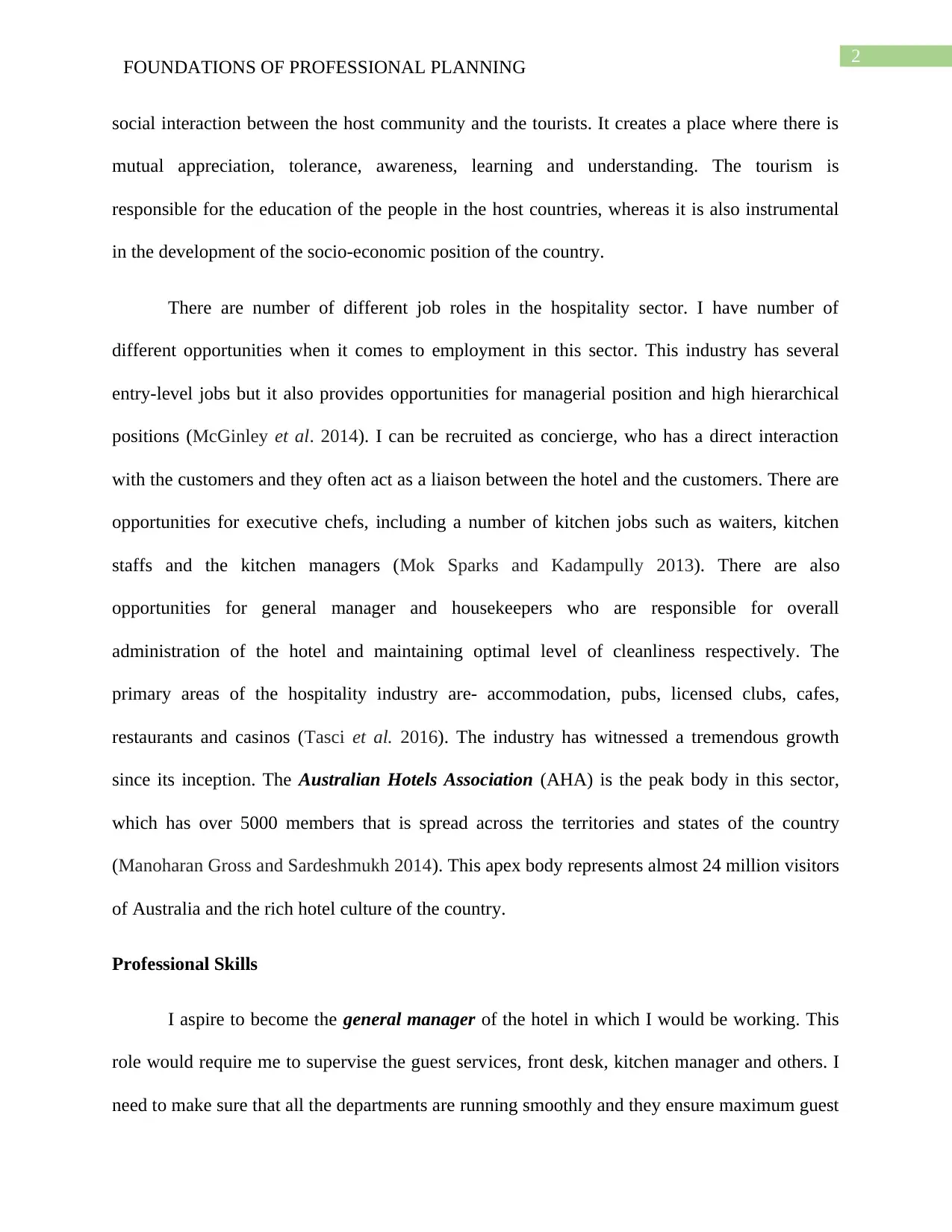
2
FOUNDATIONS OF PROFESSIONAL PLANNING
social interaction between the host community and the tourists. It creates a place where there is
mutual appreciation, tolerance, awareness, learning and understanding. The tourism is
responsible for the education of the people in the host countries, whereas it is also instrumental
in the development of the socio-economic position of the country.
There are number of different job roles in the hospitality sector. I have number of
different opportunities when it comes to employment in this sector. This industry has several
entry-level jobs but it also provides opportunities for managerial position and high hierarchical
positions (McGinley et al. 2014). I can be recruited as concierge, who has a direct interaction
with the customers and they often act as a liaison between the hotel and the customers. There are
opportunities for executive chefs, including a number of kitchen jobs such as waiters, kitchen
staffs and the kitchen managers (Mok Sparks and Kadampully 2013). There are also
opportunities for general manager and housekeepers who are responsible for overall
administration of the hotel and maintaining optimal level of cleanliness respectively. The
primary areas of the hospitality industry are- accommodation, pubs, licensed clubs, cafes,
restaurants and casinos (Tasci et al. 2016). The industry has witnessed a tremendous growth
since its inception. The Australian Hotels Association (AHA) is the peak body in this sector,
which has over 5000 members that is spread across the territories and states of the country
(Manoharan Gross and Sardeshmukh 2014). This apex body represents almost 24 million visitors
of Australia and the rich hotel culture of the country.
Professional Skills
I aspire to become the general manager of the hotel in which I would be working. This
role would require me to supervise the guest services, front desk, kitchen manager and others. I
need to make sure that all the departments are running smoothly and they ensure maximum guest
FOUNDATIONS OF PROFESSIONAL PLANNING
social interaction between the host community and the tourists. It creates a place where there is
mutual appreciation, tolerance, awareness, learning and understanding. The tourism is
responsible for the education of the people in the host countries, whereas it is also instrumental
in the development of the socio-economic position of the country.
There are number of different job roles in the hospitality sector. I have number of
different opportunities when it comes to employment in this sector. This industry has several
entry-level jobs but it also provides opportunities for managerial position and high hierarchical
positions (McGinley et al. 2014). I can be recruited as concierge, who has a direct interaction
with the customers and they often act as a liaison between the hotel and the customers. There are
opportunities for executive chefs, including a number of kitchen jobs such as waiters, kitchen
staffs and the kitchen managers (Mok Sparks and Kadampully 2013). There are also
opportunities for general manager and housekeepers who are responsible for overall
administration of the hotel and maintaining optimal level of cleanliness respectively. The
primary areas of the hospitality industry are- accommodation, pubs, licensed clubs, cafes,
restaurants and casinos (Tasci et al. 2016). The industry has witnessed a tremendous growth
since its inception. The Australian Hotels Association (AHA) is the peak body in this sector,
which has over 5000 members that is spread across the territories and states of the country
(Manoharan Gross and Sardeshmukh 2014). This apex body represents almost 24 million visitors
of Australia and the rich hotel culture of the country.
Professional Skills
I aspire to become the general manager of the hotel in which I would be working. This
role would require me to supervise the guest services, front desk, kitchen manager and others. I
need to make sure that all the departments are running smoothly and they ensure maximum guest
⊘ This is a preview!⊘
Do you want full access?
Subscribe today to unlock all pages.

Trusted by 1+ million students worldwide
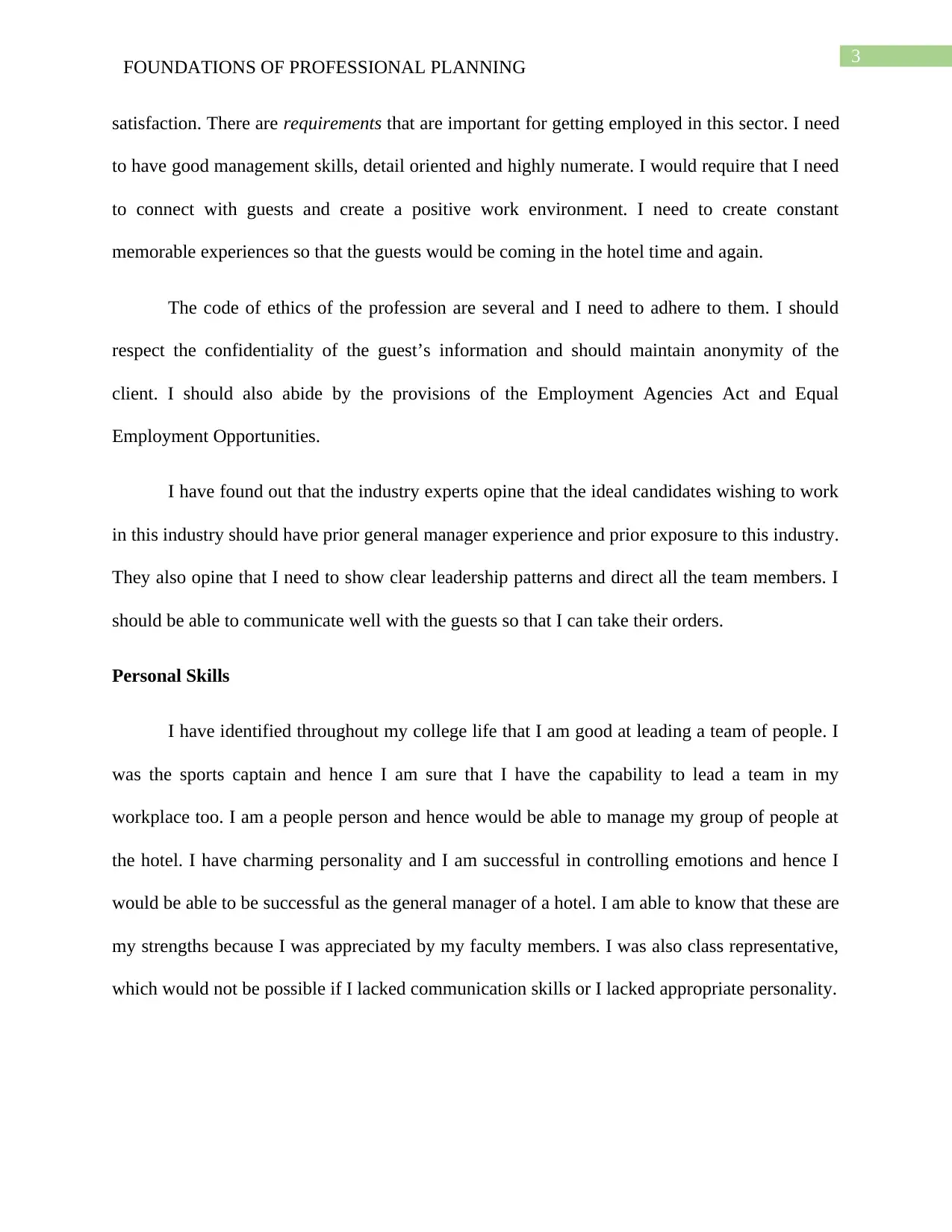
3
FOUNDATIONS OF PROFESSIONAL PLANNING
satisfaction. There are requirements that are important for getting employed in this sector. I need
to have good management skills, detail oriented and highly numerate. I would require that I need
to connect with guests and create a positive work environment. I need to create constant
memorable experiences so that the guests would be coming in the hotel time and again.
The code of ethics of the profession are several and I need to adhere to them. I should
respect the confidentiality of the guest’s information and should maintain anonymity of the
client. I should also abide by the provisions of the Employment Agencies Act and Equal
Employment Opportunities.
I have found out that the industry experts opine that the ideal candidates wishing to work
in this industry should have prior general manager experience and prior exposure to this industry.
They also opine that I need to show clear leadership patterns and direct all the team members. I
should be able to communicate well with the guests so that I can take their orders.
Personal Skills
I have identified throughout my college life that I am good at leading a team of people. I
was the sports captain and hence I am sure that I have the capability to lead a team in my
workplace too. I am a people person and hence would be able to manage my group of people at
the hotel. I have charming personality and I am successful in controlling emotions and hence I
would be able to be successful as the general manager of a hotel. I am able to know that these are
my strengths because I was appreciated by my faculty members. I was also class representative,
which would not be possible if I lacked communication skills or I lacked appropriate personality.
FOUNDATIONS OF PROFESSIONAL PLANNING
satisfaction. There are requirements that are important for getting employed in this sector. I need
to have good management skills, detail oriented and highly numerate. I would require that I need
to connect with guests and create a positive work environment. I need to create constant
memorable experiences so that the guests would be coming in the hotel time and again.
The code of ethics of the profession are several and I need to adhere to them. I should
respect the confidentiality of the guest’s information and should maintain anonymity of the
client. I should also abide by the provisions of the Employment Agencies Act and Equal
Employment Opportunities.
I have found out that the industry experts opine that the ideal candidates wishing to work
in this industry should have prior general manager experience and prior exposure to this industry.
They also opine that I need to show clear leadership patterns and direct all the team members. I
should be able to communicate well with the guests so that I can take their orders.
Personal Skills
I have identified throughout my college life that I am good at leading a team of people. I
was the sports captain and hence I am sure that I have the capability to lead a team in my
workplace too. I am a people person and hence would be able to manage my group of people at
the hotel. I have charming personality and I am successful in controlling emotions and hence I
would be able to be successful as the general manager of a hotel. I am able to know that these are
my strengths because I was appreciated by my faculty members. I was also class representative,
which would not be possible if I lacked communication skills or I lacked appropriate personality.
Paraphrase This Document
Need a fresh take? Get an instant paraphrase of this document with our AI Paraphraser
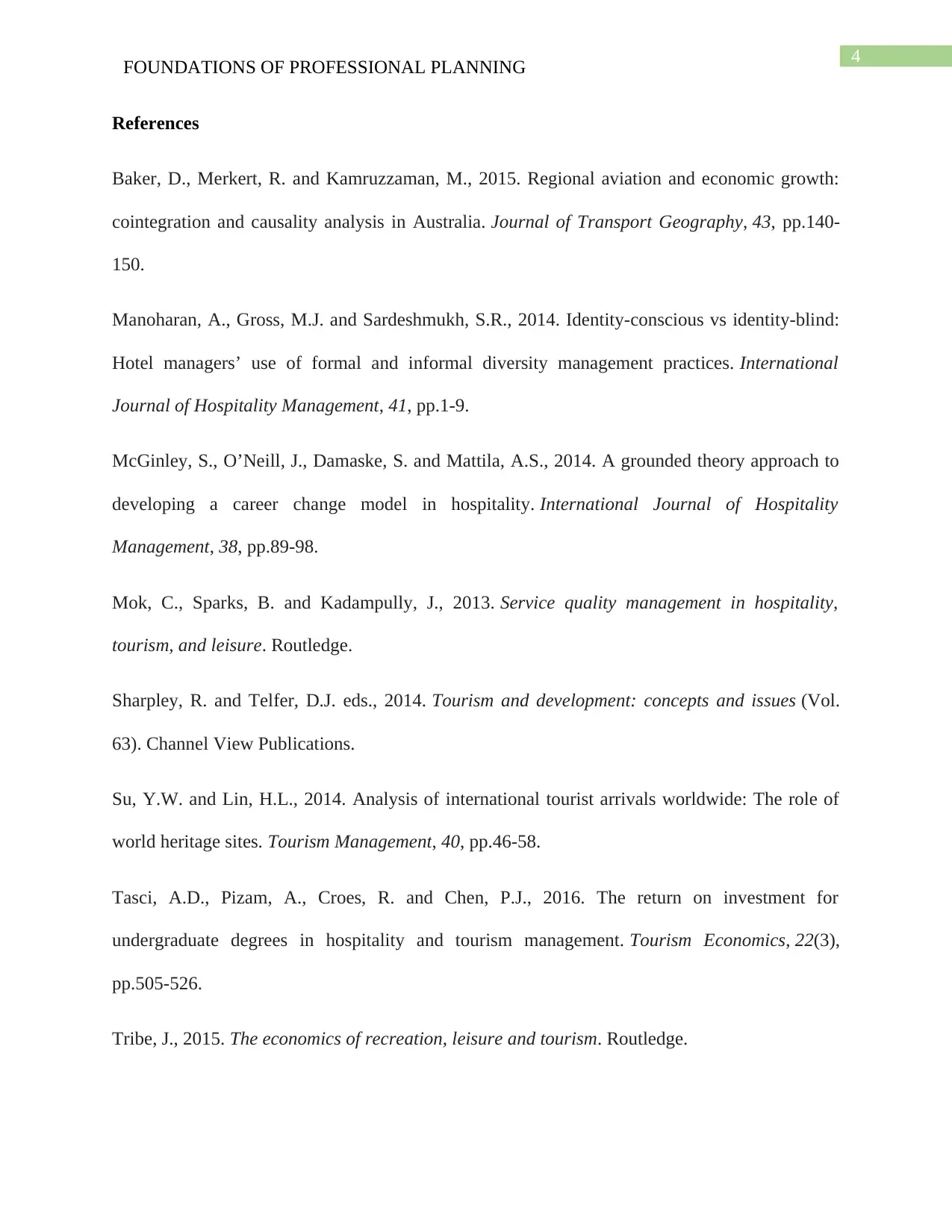
4
FOUNDATIONS OF PROFESSIONAL PLANNING
References
Baker, D., Merkert, R. and Kamruzzaman, M., 2015. Regional aviation and economic growth:
cointegration and causality analysis in Australia. Journal of Transport Geography, 43, pp.140-
150.
Manoharan, A., Gross, M.J. and Sardeshmukh, S.R., 2014. Identity-conscious vs identity-blind:
Hotel managers’ use of formal and informal diversity management practices. International
Journal of Hospitality Management, 41, pp.1-9.
McGinley, S., O’Neill, J., Damaske, S. and Mattila, A.S., 2014. A grounded theory approach to
developing a career change model in hospitality. International Journal of Hospitality
Management, 38, pp.89-98.
Mok, C., Sparks, B. and Kadampully, J., 2013. Service quality management in hospitality,
tourism, and leisure. Routledge.
Sharpley, R. and Telfer, D.J. eds., 2014. Tourism and development: concepts and issues (Vol.
63). Channel View Publications.
Su, Y.W. and Lin, H.L., 2014. Analysis of international tourist arrivals worldwide: The role of
world heritage sites. Tourism Management, 40, pp.46-58.
Tasci, A.D., Pizam, A., Croes, R. and Chen, P.J., 2016. The return on investment for
undergraduate degrees in hospitality and tourism management. Tourism Economics, 22(3),
pp.505-526.
Tribe, J., 2015. The economics of recreation, leisure and tourism. Routledge.
FOUNDATIONS OF PROFESSIONAL PLANNING
References
Baker, D., Merkert, R. and Kamruzzaman, M., 2015. Regional aviation and economic growth:
cointegration and causality analysis in Australia. Journal of Transport Geography, 43, pp.140-
150.
Manoharan, A., Gross, M.J. and Sardeshmukh, S.R., 2014. Identity-conscious vs identity-blind:
Hotel managers’ use of formal and informal diversity management practices. International
Journal of Hospitality Management, 41, pp.1-9.
McGinley, S., O’Neill, J., Damaske, S. and Mattila, A.S., 2014. A grounded theory approach to
developing a career change model in hospitality. International Journal of Hospitality
Management, 38, pp.89-98.
Mok, C., Sparks, B. and Kadampully, J., 2013. Service quality management in hospitality,
tourism, and leisure. Routledge.
Sharpley, R. and Telfer, D.J. eds., 2014. Tourism and development: concepts and issues (Vol.
63). Channel View Publications.
Su, Y.W. and Lin, H.L., 2014. Analysis of international tourist arrivals worldwide: The role of
world heritage sites. Tourism Management, 40, pp.46-58.
Tasci, A.D., Pizam, A., Croes, R. and Chen, P.J., 2016. The return on investment for
undergraduate degrees in hospitality and tourism management. Tourism Economics, 22(3),
pp.505-526.
Tribe, J., 2015. The economics of recreation, leisure and tourism. Routledge.
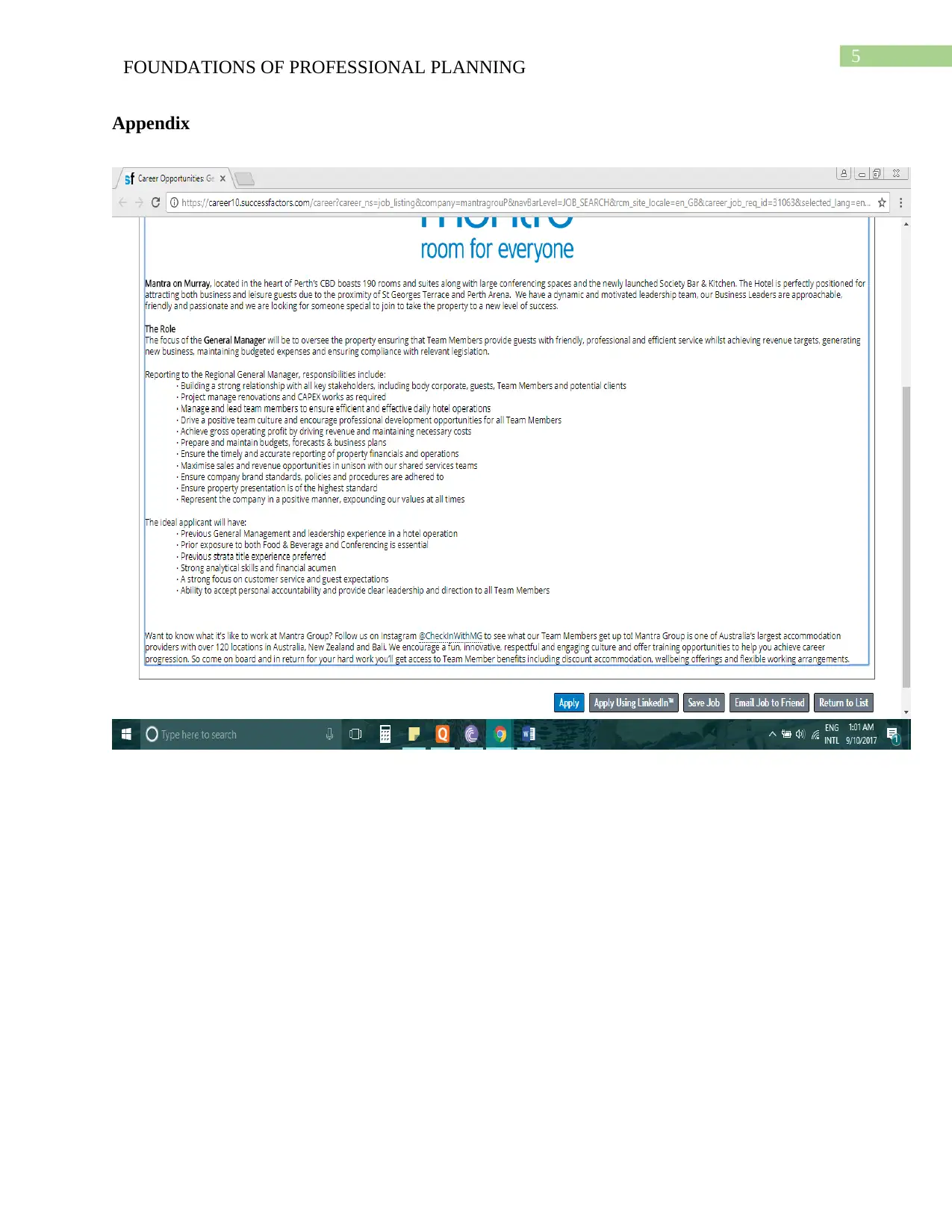
5
FOUNDATIONS OF PROFESSIONAL PLANNING
Appendix
FOUNDATIONS OF PROFESSIONAL PLANNING
Appendix
⊘ This is a preview!⊘
Do you want full access?
Subscribe today to unlock all pages.

Trusted by 1+ million students worldwide
1 out of 6
Related Documents
Your All-in-One AI-Powered Toolkit for Academic Success.
+13062052269
info@desklib.com
Available 24*7 on WhatsApp / Email
![[object Object]](/_next/static/media/star-bottom.7253800d.svg)
Unlock your academic potential
Copyright © 2020–2026 A2Z Services. All Rights Reserved. Developed and managed by ZUCOL.





